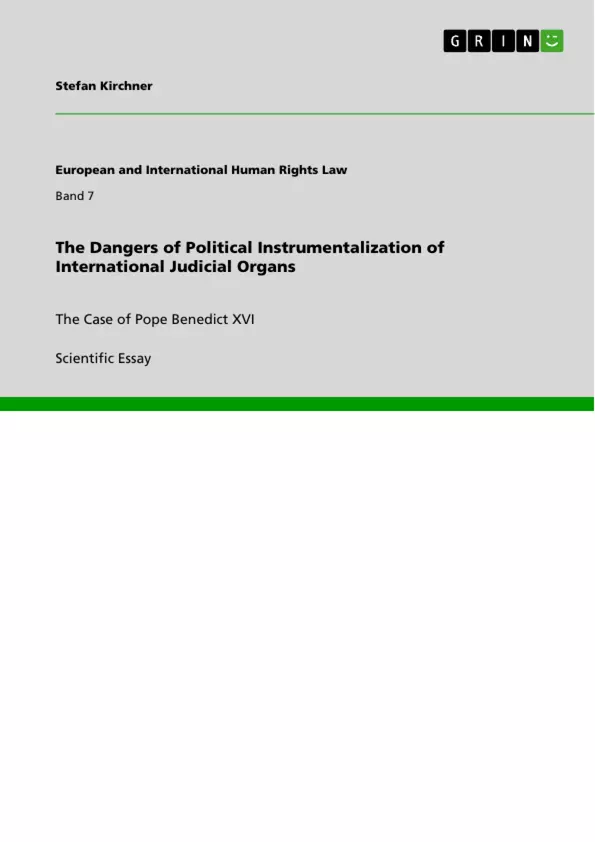The child abuse scandal has rocked the Catholic church and has triggered a strong response by the church leadership, first and foremost by Pope Benedict XVI. On 13 September 2011, a case was brought against the pope and several other high ranking church officials at the International Criminal Court in The Hague for alleg-edly “enabling” child abuse to go unpunished. It has been claimed that this would amount to crimes against humanity. In this short text it will be shown that there has been no “enabling” on the part of the Holy Father, that there is no basis for a criminal responsibility and that such obviously unfounded claims can actually have serious impacts on the proper functioning of international judicial organs. The con-clusion is reached that the International Criminal Court is the wrong place to reg-ister grievances in this context and that the justice which all victims deserve will not be achieved in this manner. This article is part one in a new series on European and International Human Rights Law.
Inhaltsverzeichnis (Table of Contents)
- The Dangers of Political Instrumentalization of International Judicial Organs
- The Case of Pope Benedict XVI
Zielsetzung und Themenschwerpunkte (Objectives and Key Themes)
This text explores the dangers of political instrumentalization of international judicial organs using the case of Pope Benedict XVI and the child abuse scandal in the Catholic Church as an example. The text argues against the accusation of "crimes against humanity" levelled against Pope Benedict XVI and several other Vatican officials, stating that there is no basis for such a claim under international law.
- The abuse of international judicial organs for political purposes.
- The importance of upholding the principles of international criminal law.
- The impact of unfounded accusations on the effectiveness of international courts.
- The need to balance accessibility with responsible use of international legal institutions.
- The role of the Catholic Church in combating child abuse.
Zusammenfassung der Kapitel (Chapter Summaries)
The text begins by outlining the allegations against Pope Benedict XVI and other Vatican officials, specifically relating to the accusation of "enabling" child abuse. It argues that this accusation misinterprets both the actions of the church and the principles of international law. The author emphasizes that the Catholic Church has a long-standing commitment to preventing child abuse and has taken numerous steps to address the issue. He further argues that the ICC is not an appropriate venue for addressing this issue, as it should be reserved for cases where state authorities are unable or unwilling to act. The text concludes by highlighting the potential damage that unfounded accusations can have on the functioning of international judicial institutions, stressing the importance of responsible use of such institutions.
Schlüsselwörter (Keywords)
The key topics covered in this text include the political instrumentalization of international judicial organs, specifically the International Criminal Court, the misuse of international legal institutions, and the importance of upholding the principles of international criminal law. The text also explores the role of the Catholic Church in addressing child abuse, the dangers of unfounded accusations, and the need for responsible use of international legal institutions.
Frequently Asked Questions
Why was a case brought against Pope Benedict XVI at the ICC?
In 2011, allegations were made that high-ranking church officials "enabled" child abuse, which was claimed to be a crime against humanity.
Is the International Criminal Court (ICC) the right place for this case?
The author argues that the ICC is the wrong venue because there is no basis for criminal responsibility under international law in this specific context.
What are the dangers of "political instrumentalization" of courts?
Unfounded claims for political purposes can damage the credibility and proper functioning of international judicial organs.
Has the Catholic Church taken steps against child abuse?
Yes, the text emphasizes that the church leadership, including Pope Benedict XVI, has triggered a strong response to address and prevent abuse.
What is the conclusion regarding "crimes against humanity" in this case?
The text concludes that the legal requirements for "crimes against humanity" are not met and the accusations are unfounded.
- Quote paper
- Rechtsanwalt Stefan Kirchner (Author), 2011, The Dangers of Political Instrumentalization of International Judicial Organs , Munich, GRIN Verlag, https://www.grin.com/document/178608



